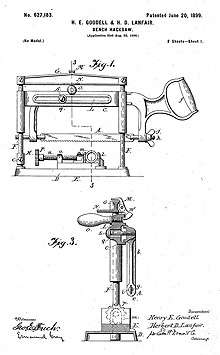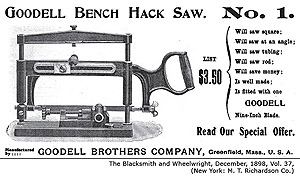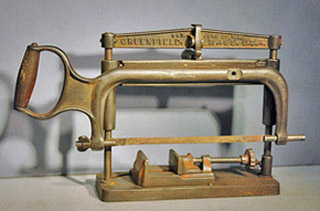|
During 1897
William M. Pratt continued
improving the company operations, producing new tools and
issuing
another catalog. The cover page proudly displayed the
title - "Goodell Brothers Company, Manufacturers of Mechanics
Tools and Specialties, Greenfield Mass. U.S.A., No. 2." (20)
In 1898 the
company issued their last catalog under the Goodell Brothers Co. name - "Mechanics Tools, manufactured
by Goodell Brothers Company, Greenfield Mass., U.S.A., No.3".
It was announced in the American Machinist magazine in April,
1898 and in Machinery journal in May, 1898.

On April 12, 1899, Goodell Brothers Co. was re-certified and the
name was changed to Goodell-Pratt Co.(21) The event was
announced in the May, 1899 issue of the Carpentry and Building magazine:
"The Goodell-Pratt
Company, Greenfield, Mass, is now the name of the firm
formerly known as the Goodell Brothers Company, well known
as manufacturers of mechanics’ tools. They advise us that
the officers, directors, management and location remain the
same as formerly."
The Goodell-Pratt Company came alive!
Goodell, Son & Co.
In 1897, Henry E. Goodell, together with his son Harry G. Goodell
and Herbert D. Lanfair, a nephew, organized the Goodell,
Son & Company.(22)
An interesting note on preliminary
planning for this
company was published by the North Adams Daily Transcript in January
27, 1897:
"Henry E. Goodell, the former
president of the Goodell Bros' company and Harry G. Goodell,
his son has now severed their relations with the
company. They remained for three weeks to assist
Superintendent Taft in becoming accustomed to his new
duties. The Goodells retired with
the best wishes for the success of the company, and still
they are perfectly free to engage in the same business.
Yesterday the Messrs.
Goodell and H. D. Lanfair, a relative of the Goodells,
started in small way to develop certain ideas on hardware
specialties that H. E. Goodell has long wished to develop.
They have engaged rooms in Pond's Miles Street block and use
electricity. Judging of the success that Mr. Goodell has
achieved heretofore, the foundations of a promising new
industry were started yesterday."
This inconspicuous note revealed one
interesting piece of information - Herbert D. Lanfair was
Goodells’ relative. I discovered that Herbert D. Lanfair was a son of Anne P.
Goodell, older sister of the Goodell brothers. She
married David W. Lanfair in 1855 and Herbert D. was their third
child, born in 1861. Hence, Herbert D. Lanfair was the Goodell
brothers' nephew. (23)
The business that emerged from these
ideas and planning was the Goodell, Son & Company. Henry E. Goodell and
Herbert D. Lanfair plunged into a new venture without delay.
They began working on designing a Bench Hack Saw. Indeed, in
August, 1898, they filed a joint patent application. The patent
No. 627,183
was granted on June 20, 1899. The description in the patent
provided clear and concise objectives:
 "Our invention is an
improvement in a hack-saw, a carriage, and the frame of the
same. It has for its object
chiefly to provide a hack-saw firmly and adjustably fixed in
a frame and in connection therewith a carriage, by means of
which the said saw may be adjusted vertically and
reciprocated horizontally. "Our invention is an
improvement in a hack-saw, a carriage, and the frame of the
same. It has for its object
chiefly to provide a hack-saw firmly and adjustably fixed in
a frame and in connection therewith a carriage, by means of
which the said saw may be adjusted vertically and
reciprocated horizontally.
In connection with the base
of the carriage is an adjustable vise adapted to hold the
materials of varying size to be cut at any angle with
reference to the plane of the saw."
It was a successful design and
implementation. However, despite all the right planning
the future of this company was not
meant to be. Harry G. Goodell, Henry's son,
became ill and had to resign from his duties.
The situation was serious and Henry E. decided to
stop the Goodell, Son & Co. venture short. He sold the company
to the Goodell Brothers Co. in September, 1898, after only one year
of operation.(24) These
events did not slowdown the production of
the Bench Hack Saw.
 Goodell Brothers Co., now the owner
of the patent and production rights, eagerly went to work.
By the end of 1898 the Bench Hack Saw was available for purchase and
was advertised in trade magazines. Goodell Brothers Co., now the owner
of the patent and production rights, eagerly went to work.
By the end of 1898 the Bench Hack Saw was available for purchase and
was advertised in trade magazines.
In later catalog, published by
Goodell-Pratt Co., the hack saw was described:
"A Bench Hack Saw is a
device for which there has long been a place in repair
shops, stores, and small factories. It can be readily fastened
to any bench, and will pay for itself in a week's time where
iron, steel, or brass rod or tubing have to be cut off.
 It is fitted with a swivel
vise, which can be set to saw at an angle. This point
alone is a valuable addition to the usefulness of the
machine, as the ability to saw on a miter will often save
the operator much time which would otherwise be spent in
filing."(25) It is fitted with a swivel
vise, which can be set to saw at an angle. This point
alone is a valuable addition to the usefulness of the
machine, as the ability to saw on a miter will often save
the operator much time which would otherwise be spent in
filing."(25)
(20) Information from “A
Millers Falls Home Page” website by Randy Roeder
(21)
Report of the Tax Commissioner
of the Commonwealth of Massachusetts for the year ending
December 31, 1899, (Boston, MA, 1900), 203;
Cope, Kenneth, Sorting
out the Goodell Companies, Chronicle of the Early American
Industries Association, v. 45, no. 4, (Levittown, NY,
1992), 115.
(22) Davis, William T., The
New England States, their Constitutional, Judicial, Educational,
Commercial, Professional and Industrial History, Vol. 4, (Boston, MA,
1897), 2036.
(23) Ancestry.com
(24)
Bureau of Statistics of Labor,
Commonwealth of Massachusetts, The Annual Statistics of
Manufactures for 1898, (Boston, MA: 1899), 283.
(25)
Goodell-Pratt Company, Tools Catalog No. 7, 1905, (Greenfield,
MA: Goodell-Pratt Co.), 103.
|